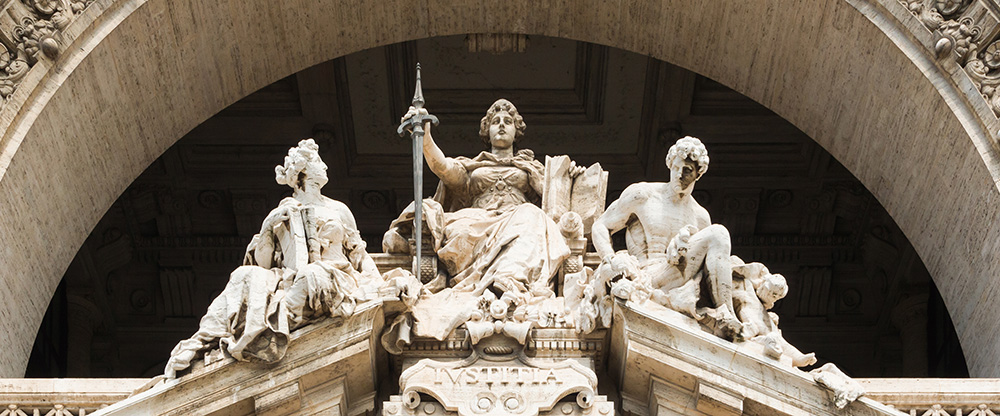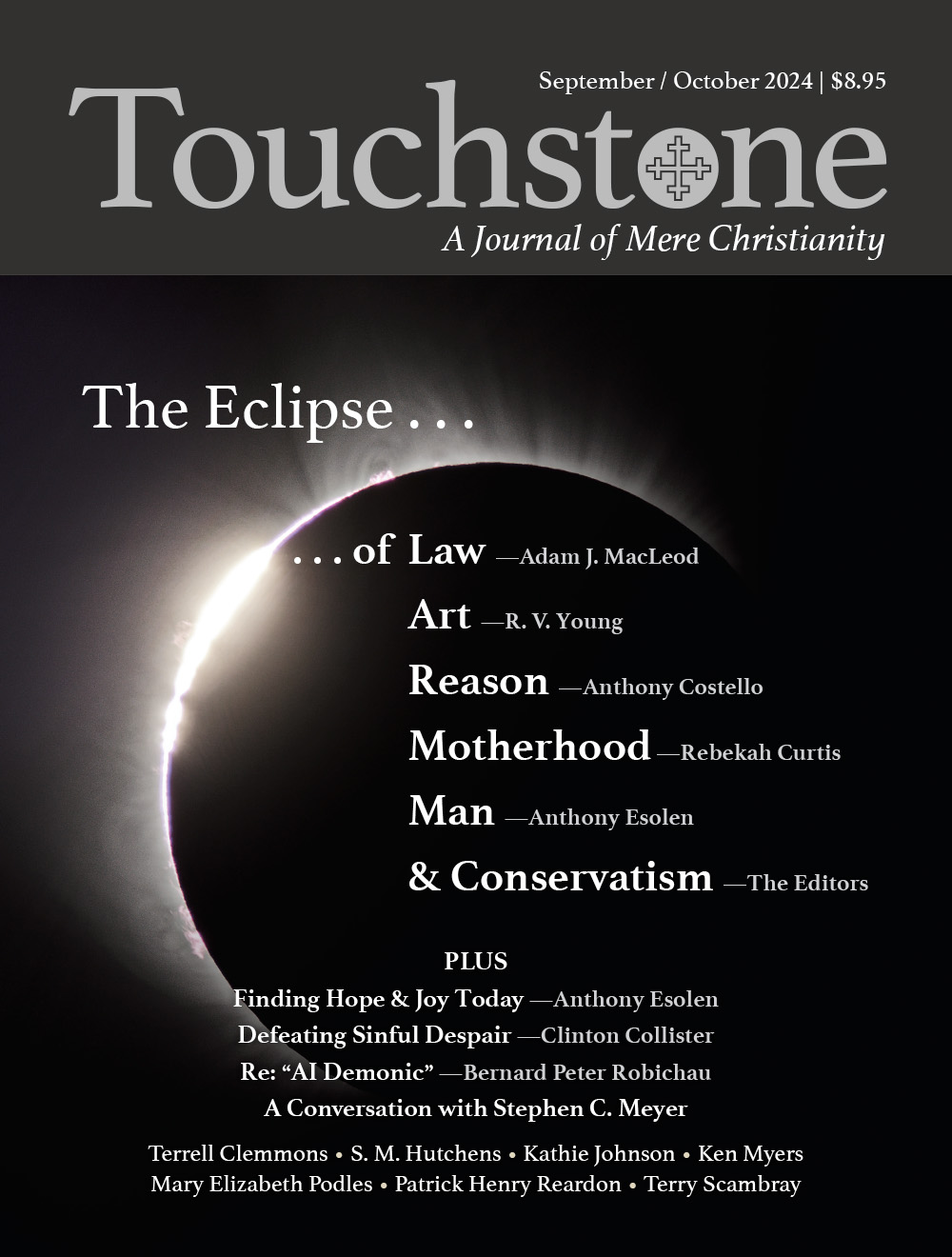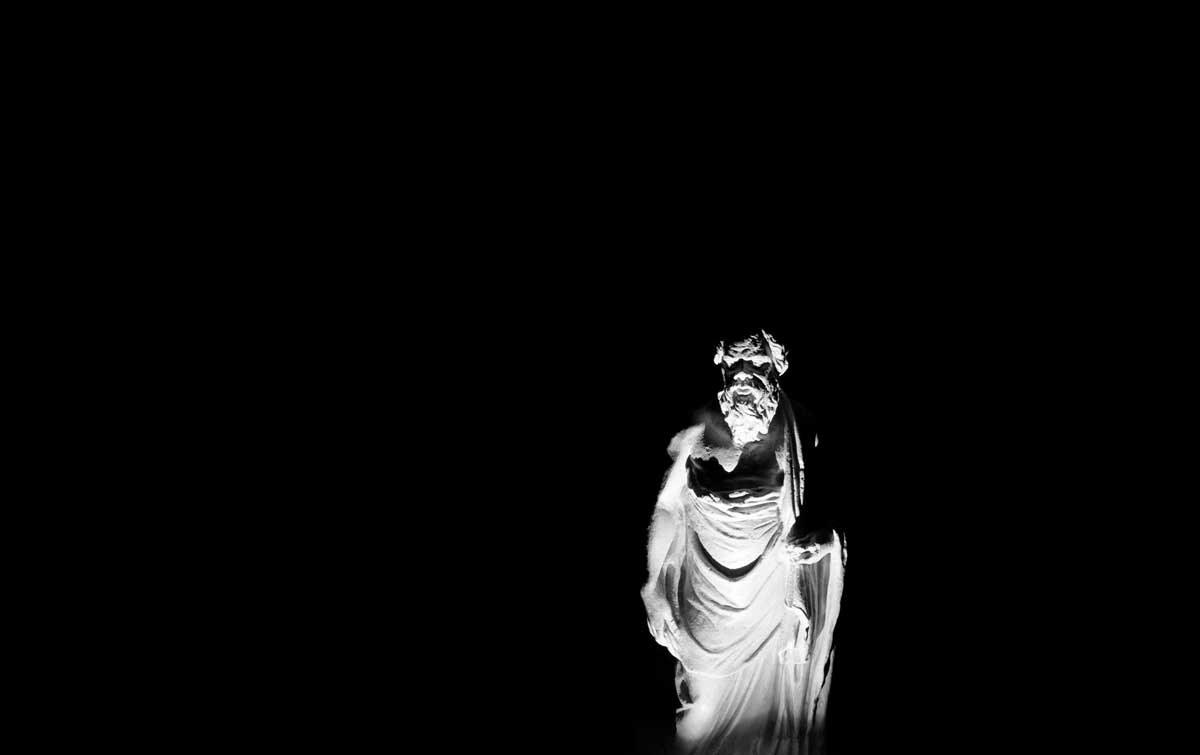How Law Lost Its Way
An Abandoned Ruling Principle & How to Get It Back
by Adam J. MacLeod
In principle, the rule of law depends upon our acceptance of one basic truth about law. However, a century ago, our legal educators rejected this basic truth, and we have now lost the rule of law in principle. I want to talk about how we gained the rule of law and how we lost it—and how to get it back.
The rule of law, one of the great achievements of Christendom, was made possible by a simple idea. Non-lawyer Americans are accustomed to taking this idea for granted, but it was radical and even unlikely when first articulated 1,400 years ago. Indeed, that lawyers are losing hold of this idea today, at the very moment when human knowledge is vast and accessible to most of the world, proves just how fragile and contingent the rule of law is in the course of human history.
The basic idea on which the rule of law is constructed, and without which it cannot be sustained, is that law is essentially something independent of mere power. Law is neither the will of the sovereign nor the threat of sanction. It is not economic coercion, or cultural coercion, or gendered coercion, or religious coercion. Power may be necessary to make the law work in marginal cases, where practical reason breaks down and lawlessness threatens to prevail. But power is a tool of the law, not its source or essence. The essence of law is not found in violence or coercion. The essence of law is located within our capacities to understand, deliberate about, and communicate practical truths about what is just and therefore right to do.
Legal Essentials
In its essence, law is a reason for our actions. Law acts not primarily within our passions, fears, and appetites but rather within our minds. Law motivates us as rational creatures, creatures who bear the image of God. Bears and wolves do not negotiate contracts or filibuster legislation. Codfish and lobsters do not argue about who bears the burden of proving fraud or defamation. No non-humans make and obey law, and all human beings have the capacity to make and obey law.
This means that law is not the exclusive prerogative of the guy with the biggest biceps or largest pile of gold. The true sense of human equality is that we are all equal participants in, and subjects of, the law. No person is above the reach of the law’s governance, and no person is beneath the reach of its reasoned justifications. No one may flout the law; no one may make the law whatever he wants. And everyone deserves an explanation for the law. We must be prepared to explain why our laws and judgments are valid and thus command obedience.
This is the basic idea of Western jurisprudence. It is the foundation of the rule of law. And because it made possible the rule of law, this idea made possible civic trust; investment, creativity, and risk-taking; free trade and commerce; trusts, corporations, and charities; education and the arts; and all the other fruits of civilization.
This idea leaves ample room for jurisprudential pluralism. Law can be many things as long as it is not merely might making right. The just must make right. And the right must be just, whether it is settled as a matter of natural justice or legal justice. Indeed, not all law must come from the same source. Some laws may be strictly necessary as a matter of natural reason, like the duties of parents toward their natural children and the inalienable right to life. Other laws are conventional, like the customary rights of trial by jury and freedom of the press. The crucial proposition to maintain is that law is not whatever the most powerful people say it is.
Justinian’s Genius
The patron of this idea, and therefore the grandfather of the rule of law, was the emperor Justinian (482–565). His Corpus Iuris Civilis (consisting of four parts: the Code, the Digest, the Institutes, and the Novels) synthesized Roman law, natural law, and the ius gentium, the law that is common to all civilized nations. Justinian’s jurists first described in detail the rights and institutions of Western law as creations of the human mind and artifacts of human making. The laws we have arelaws not merely because the senate or emperor said so but because they are the means that persons have devised to enable us to achieve justice, to do what is right with respect to other persons. They accord with practical reason. They are intelligible, logical, and rationally related to valuable human ends. And they are made things, discernable objects of human knowledge. They exist independently of sovereign will. We can study them, learn them, obey them, and hold others accountable to them.
Justinian’s jurists had on hand a compelling and vivid illustration of the separateness, priority, intelligibility, and enduring nature of law: the Twelve Tables. After the early Romans abolished the monarchy, they briefly wallowed about in chaos and ruled by “mere custom” before they appointed ten men to exercise the authority of the state to put their laws in writing on ivory tablets and to display those tablets, which were twelve in number, for public view. Thereafter, those who would rule or render judgment were obligated not to exercise their own discretion but instead to act in obedience to a “correct interpretation” of the laws. They were obligated to reason together and to connect their judgments rationally to legal texts, so that all could consider whether they were exercising legal judgment or mere power.
By placing the Twelve Tables above those whose job it was to interpret and declare their meaning, the early Romans placed power under the law. Power is under law insofar as it is governed by reason and word, and the reasoning of those entrusted with the law is open for all to examine. There legal power must remain for a people that is governed by law rather than by physical might or wealth.
Power is the part of the law that sometimes makes it effective. But it is not law’s essence. When Justinian’s jurists wrote about power, they described it as something contingent upon and created by laws, rather than the other way around. The natural power that is common to all persons is liberty. All other powers are artificial. All men are born free. For this reason, Justinian’s jurists insisted that slavery was contrary to natural law. The power of a slave-owner is an artificial creation of the ius gentium, made in response to wars and conquests as an alternative to mass slaughter.
In these ways (and others), Justinian made it possible to think of law and justice as things independent from and prior to powers. Human actions, including the actions of the most powerful, are judged by an external standard that is partly conventional but not contingent on power itself. Law is not made right by power. Power is made right to the extent that it is authorized and governed by law.
Furthermore, the law itself is under a higher law. Not all laws are human artifacts in Justinian’s account. Some laws are settled and fixed prior to and independent of all human conventions. “The laws of nature,” we read in the Institutes, “which all nations observe alike, being established by a divine providence, remain ever fixed and immutable.” The authority of such laws is not contingent upon political sovereignty. Indeed, it does not depend upon any human volition. And one need not be a legal specialist to interpret the natural law. Throughout the Corpus, there is reference to legal doctrines that are required not only by civil law but also by “natural reason.” As later jurists who built upon Justinian’s doctrines observed, natural reason is God’s gift to all who bear his image.
Rights & Natural Justice
The jurists identified law with right and justice, using the same word, ius, for all of them. Some rights are universal, required as a matter of natural justice. The truth of the universal right not to be killed intentionally is not contingent upon human consent or convention, much less on the assent of a sovereign political power. Laws that secure the right to life, as by imposing criminal sanctions on murderers and refusing enforcement to transactions whose purpose is death, are strictly required as a matter of natural, practical reason. No society can call itself just that does not have and enforce such laws. Laws prohibiting murder rest upon the authority of natural reason with or without any positive enactment declaring them.
Justinian’s jurists uncovered the universal principles within the law that reconcile law to the just and the right. In the Institutes we encounter the revolutionary claim that slavery is contrary to natural law. In the Digest, we learn that the natural law teaches us about the union of man and woman that we call matrimony, and we find the edict that a man is to be judged according to the like rule that he has caused to be applied to another, an edict of “perfect fairness.”
Throughout the entire Corpus we encounter an extended demonstration that the law of nations and the civil law of the Roman Empire are partly determined by the universal requirements of practical reason. Theft is wrong everywhere. The seas and navigable straits are inherently common resources everywhere. The natural family—mother, father, and the children born of their union—is the first juridical entity in any political community, everywhere.
To be sure, most questions of justice are not of that sort. On most of the practical questions that confront political communities on a daily basis, there is no uniquely right answer. There are more or less reasonable answers. It is reasonable for us all to drive our wagons and chariots on the same side of the road. But neither left nor right is required as a matter of natural justice. What should be the marginal tax rate for a merchant who earns 122 denarii per year? Someone must decide this question. It is a matter of human choice, to be settled by human conventions.
These are questions that Aristotle called matters of indifference and that Thomas Aquinas called determinatio. Political communities must have answers to their practical questions. But most practical questions can reasonably be settled and specified in different ways, consistent with the requirements of practical reason.
Once the questions have been answered in law, obedience to those answers is itself a requirement of justice. Following St. Paul, Aquinas and the other jurists affirmed that obedience to law is an obligation of conscience. But not all communities within a polity must have the same laws. Law is essentially reason, rather than power or coercion. And practical reason directs us toward a variety of human goods. The good of the family business is not the same as the good of the Disney Corporation. The good of the engineering college is not the good of the liberal arts college.
This is why, in a healthy political community, private law is primary while public law takes a back seat. Indeed, a mark of a healthy political regime is the proliferation of private laws and the stable simplicity of public laws. Conversely, one of the first marks of an aspiring totalitarian regime is that it eliminates all private law—all private rights of property and contract, all jury trials and other institutions of adjudication not accountable to those in power, all trusts and corporations and other legal instruments that protect private associations. Over those an unjust regime places its own arbitrary rules and judgments, which are not rationally related to the various goods of the people and their plural communities but instead serve the myopic obsessions of those in power.
On the other hand, some rights must be public because some acts are inherently wrongful. No political community can do without laws prohibiting murder, maiming, incitement, defamation and perjury, prostitution and human trafficking, trespass and theft, and abandonment of spouse and children. A political regime that tolerates or encourages inherently wrongful acts is an illegitimate regime because it acts contrary to the instrumental reason for its own existence.
An especially pernicious political regime oppresses institutions of private ordering and destroys well-reasoned private rights while refusing to vindicate public rights, allowing wrongdoers to tear at the fabric of society with impunity. Laws that are expressions of sound practical reasoning are ignored or denigrated while arbitrary laws and official acts are identified with the word “law.” This is how the rule of law is lost.
Who Killed the Law?
It goes without saying that we are losing the rule of law. The important question is: What caused us to devolve into a lawless people? No doubt many causes and many villains led us here. But some particular villains deserve special opprobrium. I intend to heap upon them the scorn and disdain that they so richly deserve, not only because it is fitting so to do but also because we need to understand how they destroyed the foundations of law before we can hope to rebuild those foundations.
The villains, you will be happy to know, are law professors. They are primarily American law professors, although they modeled their villainy on that of earlier English law professors, especially a suitably creepy villain named Jeremy Bentham (1748–1832). Before his corpse was embalmed at his request and displayed as an icon at University College London (look it up), Bentham spent his career expressing particularly corrosive disdain for the rule of law. Law is nothing more nor less than sovereign power, Bentham asserted. Any idea that law exists independent of the sovereign’s will is not to be taken seriously.
Bentham was not what one would call a man of intellectual humility. Adumbrating the tactics of postmodern activists by more than a century, he derided more than he argued. He mocked and dismissed the idea of natural rights as “nonsense on stilts.” The entire tradition of English common law could be swept aside as infantile. Customary law, he insisted, is the law of brutes. And do not make the sophomoric error of thinking you have constitutional rights. What we call “rights” are in fact mere concessions of privilege from the sovereign. They exist at the sovereign’s forbearance and are entirely contingent upon his will.
Bentham’s theory laid the foundation for what became known as English legal positivism. In its early versions, expressed by Bentham and his disciple John Austin, all law is the exercise of supreme political power. Law is not something independent of sovereignty, nor does law justify and limit political power. Rather, law is entirely contingent upon the power of whoever manages to attain and keep the highest political office.
Bentham defined law as an assemblage of signs indicating a volition conceived by the sovereign within the state to govern a person or class of persons under his power, who are in the habit of obeying him. The sovereign does not attempt to rule by appealing to the reason of his subjects. He does not communicate with his fellow human beings as rational, divine-image bearers. He simply expresses his will. He imposes his will on others by the brute fact of his sovereignty and by the unreasoned habituation of his subjects. The one limitation on the sovereign’s power is his own fear that, if he pushes his subjects too far too fast, they may awaken from their dull submissiveness, rise up, and deprive him of his sovereignty.
But Bentham and the positivists did not jettison reason entirely. On Bentham’s view, law must remain intelligible to the extent that it is necessary to communicate the sovereign’s volition. Law itself provides no reason for obedience. But to serve its function, law must effectively communicate what the sovereign commands and prohibits. So, in legal positivism, law retains the grammar of language and the form of theoretical reasoning, even though all of the practical reason has been demoted to a servile role. Theoretical reason directs us to the sovereign’s will. The sovereign uses practical reason to get his way. But Bentham and the positivists are not the only, nor even the worst, villains in this tale.
American Legal Supremacy
The next chapter of villainy brings us to American soil, where we meet an American jurist by the name of Oliver Wendell Holmes, Jr. (1841–1935). Holmes put to pragmatic ends his considerable rhetorical ability, his influence as a justice first on the Massachusetts Supreme Judicial Court and then the Supreme Court of the United States, and his proximity to elite law faculties. Holmes washed the rights and duties of the law in what he called “cynical acid,” and he began the gradual erosion of the vestiges of right and legal justice that the English positivists left in place.
In 1897, Holmes delivered on the steps of Boston University’s law school what was to become the most influential expression of American legal pragmatism. The talk was later published in the Harvard Law Review under the title “The Path of the Law.” In that landmark work, as in an earlier book deceptively titled The Common Law, Holmes fathered the novel myth that legal judgments are mere products of judicial power and that the common law is nothing more than law made by judges. Holmes stripped reason out of the common law and established a new sovereign hierarchy with judges on top.
A generation later, “legal realists” such as Karl Llewellyn, Felix Cohen, and Arthur Corbin made judicial supremacy the official dogma of elite American law schools, especially that law-professor factory called Harvard. Their disciples took this dogma with them when they joined law faculties in flyover country, and it quickly displaced the older idea of law as a reason that directs persons toward the right and the just. In the century since their evangelistic diaspora, legal realist law professors have indoctrinated generations of American lawyers to believe that all law is political power. The choice is not between law as reason and law as power. Rather, the only choice is between those who make the law: a legislative sovereign, a judicial sovereign, or an executive sovereign.
To this day, America’s most influential lawyers remain enslaved to this dogma. Liberal lawyers—think Justice Anthony Kennedy—prefer judicial supremacy. Progressive lawyers—think Justice Stephen Breyer—prefer executive supremacy. Conservative lawyers—think the late Justice Antonin Scalia—prefer legislative supremacy. But they all think of law as essentially power rather than practical reason.
Until the last decade, these modern philosophies of law correlated exactly with broader philosophical commitments. Judicial supremacists were liberal. They viewed courts as guardians of civil liberties against the predations of tyrannical majoritarian factions. Southern Democrats made the liberal view plausible when they used legislatures to enact Jim Crow segregation, and northern progressives did the same when they used legislatures to enact eugenics laws.
Administrative supremacists were progressives who believed in the omnicompetence of experts and credentialed statesmen, who, they thought, could engineer society correctly if they could rule from within administrative agencies where they would be insulated from populist pressures. The apparent triumphs of zoning regulations, a professional military and diplomatic corps, and public health officials made the progressive view plausible.
Legislative supremacists were conservatives and libertarians. They viewed unaccountable courts and administrative agencies as the chief threats to ordered liberty and the institutions of civil society. They looked to constitutional and legislative texts to place limitations on judicial and executive powers. They developed old legal interpretive methods into new theories called “originalism” and “textualism.” The judicial and executive usurpations that made their view plausible are too numerous to recount.
Recently, however, this correlation has fallen apart. All the modern legal theories have turned out to be interchangeable.
It’s All Power
That modern legal theories have turned out to be fungible is a surprise only to those who read nothing but modern legal theories. From the broader perspective of the great tradition of Western jurisprudence, stretching back 1,400 years to Justinian, the differences between legislative, judicial, and executive supremacy are not nearly as important as what they all have in common. They all treat law as essentially the exercise of power.
I do not mean that there are no important differences. Theories of law that place ultimate sovereignty in legislatures are better in degree than theories of executive or judicial supremacy. This is not because democratic tyrannies are acceptable but because legislatures are institutionally superior at reasoning about big and important practical questions. Legislatures are designed to receive input and official testimony from a wide variety of citizens, experts, and administrators. They are also built for careful deliberation about all the facets of proposed rules and for taking into account the rights of all persons within the community.
In the end, constitutional differences matter only to the extent that some officials in some places believe that law is not merely power, that they are obligated to obey duties that precede their offices, that at least some law is independent of and prior to the diktats of public officials, and that law rests upon and expresses reasons for acting in a political community.
Some modern legal theories are more compatible with the rule of law than others. Constitutional originalism conceives of the texts of constitutions the way earlier jurists conceived of independent legal reasons. But theories that tie judges to legal texts are parasitic upon the law that happens to rule us. The danger in such theories is that they remain willfully blind to the reasons which render the law coherent and worth having, and therefore can do nothing to protect us against law’s further corruption.
Professors & Accomplices
At bottom, all of America’s now-dominant jurisprudential schools are either parasitic upon or destructive of the rule of law. As Harvard law professor Joseph Singer boasted, “We are all legal realists now.”
The law professors did this. The legal realists have attained total preeminence in American legal education, pushing classical jurisprudence entirely out of the curriculum. They have even spawned progeny, such as the Law and Economics movement, whose proponents take seriously Holmes’s call for a jurisprudence of scientific prediction. Practitioners of the economic analysis of law adhere to the principle that all laws can be explained as calculated means to reduce inefficiencies resulting from information costs and other limitations of human knowledge. Economics explains everything, including the law of the family, of crime, even of charity.
And what if it doesn’t? No problem. Economic analysis of the law can simply stipulate that whatever phenomenon it examines is the revealed preference of some identifiable group of people. Business owners happen to prefer selling things, criminals happen to prefer stealing things, and religious people happen to prefer giving things away. The job of the law is to tally up the costs of these various activities and arrange everyone’s entitlements so that the costs do not outrun overall preference satisfaction.
At this point in the development of American jurisprudence, if “development” is the right word, another faction has splintered off from American legal realism. Led by another elite American law professor, Duncan Kennedy of Harvard, the Critical Legal Studies movement accepts the most basic dogma of legal realism that law is only power. But it takes this dogma even more seriously than the legal realists did. If law is merely power, then there is no reason to prefer political power to economic power, or economic power to other kinds of human inequality. Political sovereignty is artificial. And if the artifices simply anneal the privileges of the privileged, then the entire edifice of supposedly neutral legal rules must come down from its pillared temple and face critical deconstruction.
The next evolution of American jurisprudence followed very quickly and sounded the death knell for law. The Critical Legal Studies movement precipitated an avalanche of compounding critical theories whose ambition is to deconstruct law altogether and to replace it with power contests between different classes of persons and arbitrary identity groupings. The critical theorists are now busy sweeping away the husks of instrumental reason that English legal positivists and American legal realists left dangling arbitrarily from the stipulations of constitutional governance.
Early in the critical deconstruction of law, one of the fathers of critical theory, the French post-structuralist Jacques Derrida, said simply and expressly what all the modern and postmodern theorists had been driving at but had neither the courage nor the candor to place on the table for examination and acceptance. Derrida stated that law is nothing more than “a force that justifies itself.” There is no such thing as a law without coercive enforcement. Reason does not justify law; force justifies law. As another theorist explained, in Derrida’s theory, “all law is based on violence inasmuch as there is no original law, but rather all law was instituted at some time.” This dogma destroys the possibility of self-governance, of governing one’s own person and one’s community by the exercise of reason.
The rule of law requires us to exercise practical reason and to communicate our reasoned laws using a common language, which for lawyers consists of legal terms of art. Critical theories destroy the possibility of both a common reason and a common language, the two necessary preconditions for the rule of law. But in this, as in so much else, critical theorists are merely continuing a project begun by modern liberal theorists.
Critical theorists destroy the rule of law in part by destroying the intelligibility of legal personhood. Justinian and his jurists taught that persons are the point of law. The purpose of law is to direct us to give to each person what he is due as a matter of right. Critical theories divide persons into arbitrary groups and pit those groups against each other in zero-sum power contests. They remove the last vestiges of reason and language from our jurisprudential discourse and replace them with incompatible discursive regimes. They remove law from its office of governance and replace it with a hierarchy of intersectional identities, within which gratitude and obedience to authority are causes for demotion, and grievance and self-assertion move one step closer to the top of the power pyramid.
Conservative Jurists Won’t Save Us
Here’s the really bad news. If you are waiting for conservative lawyers to push back against the assumption that law is just power, you will wait a long time.
In the legal world, most conservatives refer to themselves as “originalists,” meaning they affirm strict adherence to the Constitution’s text and to the meaning of our laws at the time they were written. Many (though certainly not all) originalists today are either positivists, who accept legislative supremacy, or legal realists, who accept judicial supremacy. Their theories are different only in degree, not in kind, from critical theories (see sidebar).
Critical theories are the logical outgrowths of legal positivism and American legal realism. We must keep this truth squarely before our eyes. If law is nothing more than sovereign power, and if sovereign power is a brute fact, then there is no reason to prefer sovereign political power over cultural, social, or economic power. If human law is not grounded on the natural law, and if positive enactments are not grounded on reasonable customs and conventions, then the critical theorists are correct about liberal legal regimes. Liberal legalism by itself is arbitrary. Worse, it is very likely a dishonest façade used to cover inequalities of cultural and economic power.
So, to accept legal positivism and legal realism, even in their conservative variants, is in principle to accept critical legal studies, critical race theory, dominance feminism, queer theory, intersectionality theory, and all the other destructive demons that postmodernism is now unleashing in our legal institutions. Critical theories merely take modern legal theories to their logical extremes.
We cannot have post-structuralism and its critical theory offspring and have the rule of law. We must choose one or the other. But here is the sobering lesson for both the textualists of the Federalist Society and the judicial supremacists at the ACLU and in faculty lounges: modern theories are as incompatible with the rule of law as critical theories are. About one thing Derrida was absolutely correct, that if there is no original law which precedes and is independent of power—no natural law, no divine law, no rational customary law—then all law is ultimately mere violence.
Backtracking Forward
What is the way forward? To adapt C. S. Lewis, we now find ourselves quite far along on the wrong road. Progress requires first walking back to where we got off course.
We must restore a law-school curriculum that begins with the study of law as a corpus of practical reasons. We do not need to look far. We are fortunate to work within a jurisprudential tradition—the common law tradition—that took the best customary laws, such as trusts and jury trials and the presumption of innocence, and combined them with the best natural laws, such as the rights to life and property. Our laws are still essentially rational. By walking along and pointing out the reasons within the laws, we can call attention to the reasons for the laws. And those reasons point back to the creators of laws, beings who themselves are created in the image of God.
At this moment, we have a tremendous opportunity to get lawyers back on the right road. The Supreme Court of the United States has recently returned to an older standard for identifying and defining fundamental rights. The so-called history and tradition test, which the Court abandoned a generation ago but has now reinstituted, directs judges to look to the history of our laws and legal institutions and to discern the traditions that render that history intelligible. This jurisprudential turn gives even skeptical lawyers strong, pragmatic motivation to examine the jurisprudential concepts at the foundation of American constitutions and laws. What they will discover when they look there is a vast forest of legal norms and institutions growing out of Justinian’s insight that the point of law is to enable us to reason together and to do what is just toward other persons, human beings made in the image of God.
Restoring the law to its place within practical reason is like restoring a madman to his right mind. It does not by itself restore all that he has destroyed. But it stops him taking direction from Holmes and Foucault and Derrida. It restores his lawfulness. And it reveals the image of God within him. That is work worth doing.
Adam MacLeod is Professor of Law at St. Mary’s University and a Senior Research Fellow of the Center for Religion, Culture and Democracy.
subscription options
Order
Print/Online Subscription

Get six issues (one year) of Touchstone PLUS full online access including pdf downloads for only $39.95. That's only $3.34 per month!
Order
Online Only
Subscription

Get a one-year full-access subscription to the Touchstone online archives for only $19.95. That's only $1.66 per month!
bulk subscriptions
Order Touchstone subscriptions in bulk and save $10 per sub! Each subscription includes 6 issues of Touchstone plus full online access to touchstonemag.com—including archives, videos, and pdf downloads of recent issues for only $29.95 each! Great for churches or study groups.
Transactions will be processed on a secure server.
more on Law from the online archives

37.5—Sept/Oct 2024
Why Law Schools Can't Teach Law
A sidebar to How Law Lost Its Way by Adam MacLeod
more from the online archives
calling all readers
Please Donate
"There are magazines worth reading but few worth saving . . . Touchstone is just such a magazine."
—Alice von Hildebrand
"Here we do not concede one square millimeter of territory to falsehood, folly, contemporary sentimentality, or fashion. We speak the truth, and let God be our judge. . . . Touchstone is the one committedly Christian conservative journal."
—Anthony Esolen, Touchstone senior editor










